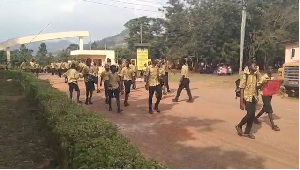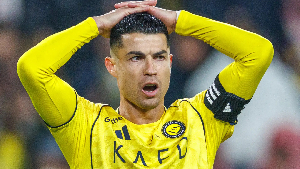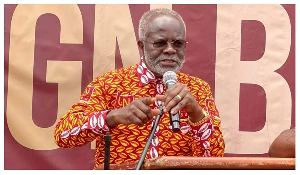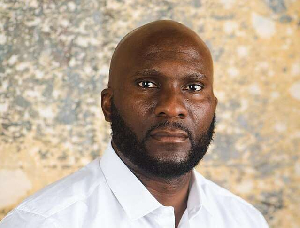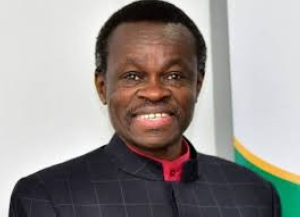and a Tribute to the People of Haiti
By Kwame Okoampa-Ahoofe, Jr., Ph.D.
I read the sympathy note to the Government and people of Haiti by Ghana’s President John Evans Atta-Mills and, as usual, could not help feeling a mixture of tragic-amusement and outright embarrassment. This feeling was provoked far less by the actual contents of the message itself, as relayed through the Ghana News Agency (GNA) by the country’s Information ministry (See “Ghana Solidarise [sic] with Haiti” Ghanaweb.com 1/15/10). Rather, it had something more to do with the abject diffidence reflected in the tone of the message.
In essence, what I am trying to place the ballpoint of my pen on is the nauseatingly characteristic streak of tardiness, almost verging on outright reluctance, which characterizes most of the public promises issued from either the august office of the Ghanaian premier or his evidently slow-thinking propaganda operatives at the Ministry of Information. We witnessed the same tardy attitude in the heady aftermath of Ghana’s Under-20 national soccer team’s clinching a World-Cup victory.
In that instance, the office of President Atta-Mills issued a congratulatory message to the Under-20 team members, coach and other supervisory officials and then, rather despondently, added that the Government was in the process of determining how best to reward these undisputed national heroes “at the most appropriate time” in the offing.
What immediately bothered the fervidly patriotic Ghanaian was the apparent lack of preparedness to promptly reward a well-deserving team. In critical-thinking terms, it uncomfortably felt as if the Atta-Mills government had actually not expected Ghana’s Under-20 team to triumph in the tournament. Thus once the unexpected happened, the government was caught flatfooted or with its proverbial pants down and its hitherto deftly concealed erectile dysfunction in the full glare of our collective national conscience. And it goes without saying that the foregoing was hardly the kind of scenic view with which Ghanaians expected to be confronted by a government that unctuously claims to uniquely have their best interests at heart.
What was also intriguingly bizarre about the foregoing is that by acting tardily in its reciprocal response to our Under-20 World-Soccer champions, the President ended up almost having to awkwardly compete for the attention of the victors with his Ivorian counterpart, President Laurent Gbagbo, who had earlier on promised to present Ghana’s Under-20 team members with gold medals should the players acquit themselves creditably in the global soccer arena. Of course, knowing what we have now come to sadly learn about “Oguaa Kofi,” no one ought to anticipate any reciprocal gesture in the event of the Ivorians emerging as the soccer elephants in the ongoing African Nations’ Cup.
For me, though, the latest apocalyptic earthquake devastation to hit the Afro-Caribbean nation of Haiti feels eerily personal. For throughout the 1980s and 1990s, I regularly participated in protest demonstrations with Haitian New Yorkers, largely in front of the Haitian Consulate at the United Nations and New York City’s landmark Central Park and even had the chance of meeting deposed President Jean-Bertrand Aristide. And I heartily confess that Haitians are indisputably the most Afrocentric of Diaspora Africans, and indescribably proud of having been the very first among our race to sound the death-knell, in 1804, to Western slavo-colonial imperialism.
Ironically, it was such resonant achievement, which also served as a seminal beacon of liberty for most of the Latin-American countries, among them the neighboring Dominican Republic, Bolivia and Venezuela that also motivated the Western powers to guarantee that Haiti would be perennially victimized and held, scapegoat fashion, as a classical example of “a bad-assed Nigger.”
You see, by defeating the great Emperor Napoleon Bonaparte’s army and massively deporting the white slavocrats of Hispaniola, both French and Spanish, the Africans of Haiti had effectively guaranteed that the primeval race of humanity would not be perpetually held in subjection and derision.
Indeed, in a blog comment to a New York Times article of January 15, 2010, this is what I heavy-heartedly wrote: “I demonstrated against Gen. Namphy with Haitians at the Haitian Consulate to the United Nations in 1988; then I demonstrated against Gen. Raoul Cedras with Haitians; and then also, I met then-deposed [first time around] President Aristide at New York City’s Central Park among a group of supporters protesting his overthrow by the Haitian military. Now, in the wake of perhaps the most devastating earthquake to [ever] strike Haiti, who do I demonstrate against? Someone tell me?!”
We must also bear poignantly in mind that just like Port-au-Prince, the Haitian capital, Ghana’s Accra lies squarely in an earthquake zone and, just exactly like Port-au-Prince, Accra lies 70 miles from a fairly constantly shifting tectonic plate. Knowing what we know about the deathly tardiness of President Atta-Mills, could any civically diligent and responsible Ghanaian entrust his/her destiny, in case of an emergency on the apocalyptic order of that of Port-au-Prince, to President Atta-Mills?
Anyway, in case Oguaa Kofi has run out of creatively prompt ways of assisting the tectonically traumatized people of Haiti, here is one simple approach. Have Ghanaian pupils and students collect one cedi each; then put them together and donate these “modest” gifts to the Red Cross/Crescent to be sent to our kinsmen and women of Haiti. I shamelessly and unabashedly “stole” this idea from the missionary operators of the Catholic pre-kindergarten school which my 4-year-old and namesake attends in Bronx, New York. And I thought, dear Oguaa Kofi, that you could readily use such a simple and creative idea. A belated Happy New Year to you, Sir!
*Kwame Okoampa-Ahoofe, Jr., Ph.D., is Associate Professor of English, Journalism and Creative Writing at Nassau Community College of the State University of New York, Garden City. He is a Governing Board Member of the Accra-based Danquah Institute (DI), the pro-democracy think tank, and the author of 21 books, including “Ghanaian Politics Today” (Atumpan Publications/Lulu.com, 2008). E-mail: okoampaahoofe@aol.com. ###
Opinions of Sunday, 17 January 2010
Columnist: Okoampa-Ahoofe, Kwame


